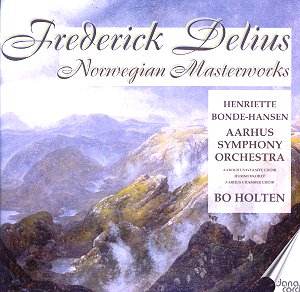Following the success of their previous disc – DACOCD
536 – Holten and his forces turn to more Delius and demonstrate an equal
measure of intelligence, sensitivity and acute stylistic awareness.
The most notable feature of the new disc is the orchestration Holten
has himself undertaken of the Five Songs from the Norwegian that
Delius dedicated to Nina Grieg in 1888. Of the five only The Nightingale
will be generally familiar, even to confirmed Delians, and that
perhaps mainly from the collaboration of Dora Labbette and Thomas Beecham
in their 1929 recording. Holten’s orchestrations are expressive, apt,
quite extensive and entirely convincing. The soprano is Henriette Bonde-Hansen,
whose excellent musicianship is a real boon, her voice even and clear
across the scale; as importantly she observes the longer line of each
setting with close attention to detail. In the Slumber Song,
an idiomatic and eventful setting, she is especially pleasurable and
in The Nightingale, taken quite slowly, throughout which intrusive
brass and wandering oboes add their own indelible orchestral pleasures,
she is equally impressive. Holten has caught the mood of languid simplicity
embedded in Summer Eve and his delicately effective setting marks
the central point in the five-poem cycle. He could quite easily have
succumbed to the rich orchestral potential for the macabre in the fourth
poem, Longing, but whilst it’s a rich and fulsome orchestration
it remains strictly within Delian bounds. The final setting, of Andreas
Munch’s Sunset, is notable for the cello depth, the rich brown
sonority thus imparted, and for the piping trilling woodwind, as the
earth is enveloped by night in gorgeous liquidity.
Which are riches enough, of course, even without the
remainder of the programme. Eventyr ("Once upon a time") has
a splendid sense of flux; Holten takes some passages really quite briskly
but never sounds unduly forced. There’s vigour here and a sense of movement
but not of breathlessness, the Straussian crypto-programmatic tapestry
very well integrated; even the brazen yells are good. The first performance
of Sleigh Ride took place in 1946, conducted by Richard Austin,
at the second Beecham-organised Delius Festival, getting on for sixty
years after it was written (it was actually orchestrated in 1889). Infectious
and full of light charm it receives a commensurately charming unforced
performance. Finally, The Song of the High Hills. This is an
exceptionally difficult piece successfully to bring off. Its relatively
high degree of sectionality can cause real problems if a conductor is
unversed in such matters and lacks the imagination and will to create
a convincing arc that embraces all the seemingly disparate passages.
That Holten succeeds to a large degree is a tribute both to his sensitivity
and acumen. He is not afraid to be emphatic, nor to dramatise the colour
in the score, but seldom if ever at the expense of the Delian line,
that necessary spine without which performances can congeal or become
flabby. In these matters affection is no substitute for a just sense
of movement. The two soloists, Kjøller and Hansen, are fine and
the ensemble excellent; the chorus is alert to dynamic range and some
of their entries are exceptionally quietly achieved.
Notes are by Lionel Carley, in English only, and as
ever a potent mix of biography and cogent quotation, and there are translations
of all texts. The sound quality was overseen by Lennart Dehn and is
all one could hope for; spacious without losing focus. As with the first
issue in this series, this is a most impressive achievement and very
warmly recommended.
Jonathan Woolf
